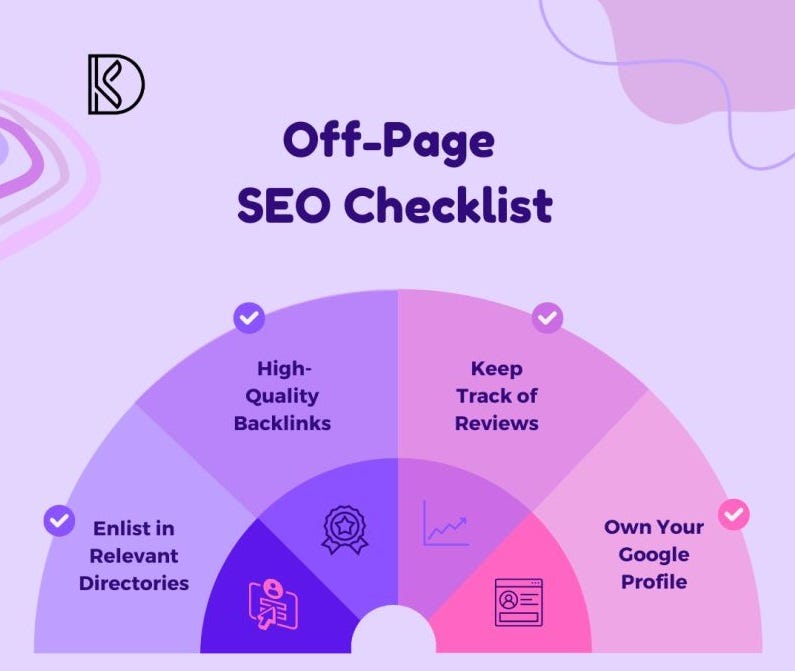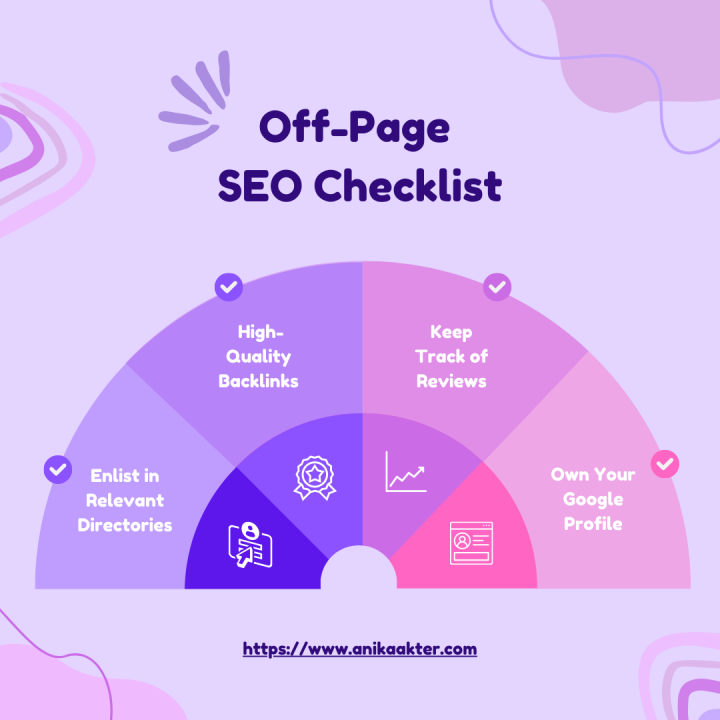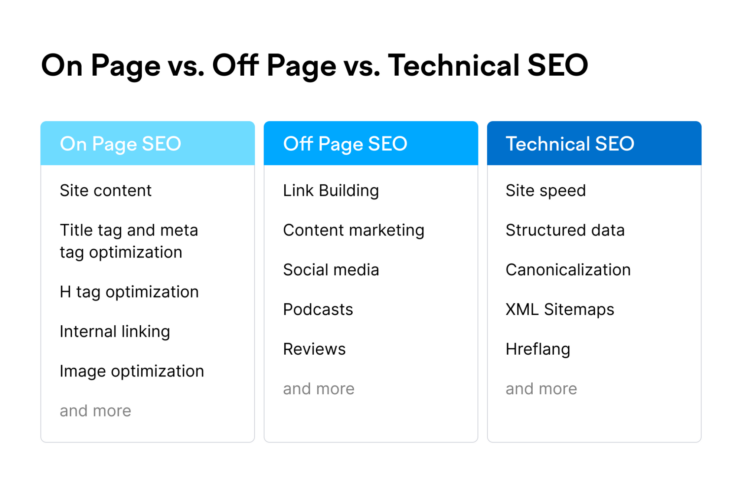Unlock the secrets to boosting your website’s authority with this comprehensive off-page SEO checklist. Watch your rankings soar!

Image courtesy of via DALL-E 3
Table of Contents
- Introduction to Off-Page SEO
- Understanding Backlinks
- Effective Link Building Strategies
- Building a Strong Social Media Presence
- Online Reviews and Local SEO
- Content Marketing for Off-Page SEO
- Leveraging Online Communities and Forums
- Monitoring and Analyzing Your Off-Page SEO
- Conclusion
- Frequently Asked Questions (FAQs)
Introduction to Off-Page SEO
Welcome to the world of Off-Page SEO! In this section, we will explore the basics of Off-Page SEO and why it is crucial for enhancing your website’s authority and visibility on search engines.
So, what exactly is Off-Page SEO? In simple terms, Off-Page SEO refers to all the activities you do outside of your website to improve its ranking on search engine results pages. While On-Page SEO focuses on optimizing your website’s content and structure, Off-Page SEO deals with factors like backlinks, social media engagement, and online reputation.
Why is Off-Page SEO so important? Well, search engines like Google consider various factors when ranking websites, and Off-Page SEO plays a significant role in determining your website’s credibility and relevance. By implementing effective Off-Page SEO strategies, you can boost your website’s authority and attract more organic traffic.
In the next sections, we will delve deeper into topics like backlinks, social media presence, online reviews, content marketing, online communities, and tools for monitoring and analyzing your Off-Page SEO efforts. By mastering these aspects of Off-Page SEO, you can significantly improve your website’s visibility and overall performance in search engine rankings.
Understanding Backlinks
Backlinks are a key element of Off-Page SEO that can significantly boost your website’s authority and visibility on search engines. In simple terms, backlinks are like digital referrals or recommendations from other websites to yours. They act as a signal to search engines that your content is valuable and trustworthy.
What Are Backlinks?
Backlinks, also known as inbound links or incoming links, are hyperlinks that direct users from one website to another. These links are like votes of confidence for your website, indicating to search engines that your content is relevant and credible. The more high-quality backlinks you have pointing to your site, the more authority you are seen to have in the eyes of search engines.
Why Backlinks Matter
Backlinks are vital for improving your website’s authority and search engine ranking. Search engines like Google consider backlinks as a way to determine the credibility and relevance of a website. Websites with a strong backlink profile tend to rank higher in search results, making it easier for users to discover their content.
Types of Backlinks
There are different types of backlinks, including dofollow and nofollow links. Dofollow links pass on link equity, helping to boost your website’s authority. On the other hand, nofollow links do not pass on link juice, but they can still drive referral traffic to your site. It’s essential to have a mix of both types of backlinks to create a diverse and natural link profile.
Effective Link Building Strategies
Link building is a crucial aspect of off-page SEO that can significantly impact your website’s authority and visibility on search engines. When done right, quality link building can help improve your search engine ranking and drive more organic traffic to your site. Here are some effective strategies to build high-quality backlinks safely and effectively:

Image courtesy of himaanali.medium.com via Google Images
Guest Blogging
Guest blogging involves writing articles for popular blogs within your industry or niche. By providing valuable content to other websites, you can get quality backlinks in return. This not only helps improve your website’s authority but also exposes your brand to a wider audience.
Social Media Engagement
Active participation on social media platforms can also help generate backlinks to your website. By sharing your content and engaging with your audience, you can attract social signals that indicate to search engines that your content is valuable and worth linking to.
Influencer Collaboration
Collaborating with influencers in your industry can be another effective way to gain backlinks from reputable sources. Influencers often have a strong online presence and a loyal following, making them valuable partners for link building. By working with influencers, you can leverage their authority and reach to attract quality links to your site.
Building a Strong Social Media Presence
Social media has become an integral part of our daily lives, offering a powerful platform to connect with others and share information. But did you know that having a strong social media presence can also significantly impact your website’s authority and visibility on search engines? In this section, we’ll explore the importance of social media for Off-Page SEO and provide tips on how to build a robust online presence that enhances your website’s reputation.
Choosing the Right Platforms
When it comes to social media, not all platforms are created equal. It’s essential to select the right ones that align with your niche and target audience. For instance, if you’re in the visual arts industry, platforms like Instagram and Pinterest may be more beneficial compared to LinkedIn. By focusing your efforts on the platforms where your target audience is active, you can maximize the impact of your social media presence.
Creating Engaging Content
Content is king in the world of social media. To attract followers and encourage engagement, you need to create content that resonates with your audience. This could include informative blog posts, captivating videos, or eye-catching graphics. By consistently posting high-quality content that adds value to your followers, you can establish yourself as an authority in your niche and attract a loyal following.
Interacting with Your Audience
Building a strong social media presence isn’t just about posting content – it’s also about engaging with your audience. Responding to comments, answering questions, and participating in conversations can help foster a sense of community and build trust with your followers. By actively interacting with your audience, you can create a more meaningful connection that encourages them to not only follow your social media accounts but also visit your website and engage with your content.
Online Reviews and Local SEO
Having positive online reviews can boost your local SEO, making it easier for potential customers to find and trust your business. Let’s dive into why online reviews are essential for your website’s visibility and how you can encourage happy customers to leave their feedback.

Image courtesy of www.linkedin.com via Google Images
Importance of Reviews
Online reviews act as social proof for your business. When people see positive reviews from satisfied customers, they are more likely to trust your products or services. Search engines like Google also take into account the quality and quantity of reviews when ranking websites in local search results. The more positive reviews you have, the more credibility your business gains in the eyes of both customers and search engines.
Encouraging Happy Customers to Leave Reviews
Happy customers are your best advocates. Encourage them to leave reviews by making it easy for them to do so. You can send follow-up emails thanking them for their purchase and kindly asking for feedback. Display review prompts on your website or social media channels to remind customers to share their experiences. Offering incentives like discounts or giveaways for leaving reviews can also motivate customers to spread the word about your business.
Content Marketing for Off-Page SEO
Content marketing is a powerful tool for boosting your website’s authority and visibility on search engines. By creating high-quality and shareable content, you can attract backlinks from other websites, increasing your off-page SEO efforts.
Creating High-Quality Content
When it comes to content marketing for off-page SEO, quality is key. Make sure your content is informative, engaging, and valuable to your audience. This could be in the form of blog posts, infographics, videos, or any other type of content that resonates with your target audience.
Promoting Your Content
Once you have created high-quality content, the next step is to promote it effectively. Share your content on social media platforms, reach out to influencers in your industry to promote it, and engage with online communities and forums where your target audience hangs out. The more exposure your content gets, the more likely it is to attract backlinks from other websites.
Leveraging Online Communities and Forums
Being active in online communities and forums can significantly boost your website’s off-page SEO strategy. By engaging with like-minded individuals and sharing valuable insights, you can drive referral traffic and build credibility for your website.

Image courtesy of www.ezrankings.com via Google Images
Finding the Right Communities
When looking for online communities to join, it’s essential to focus on platforms that align with your niche or industry. By participating in relevant groups, you can connect with potential customers and establish yourself as an authority in your field.
Participating Actively
To make the most of online communities and forums, it’s crucial to contribute meaningfully to discussions. Share your expertise, answer questions, and provide valuable insights to showcase your knowledge and expertise. By actively engaging with other members, you can attract more followers and drive traffic to your website.
Monitoring and Analyzing Your Off-Page SEO
Once you have implemented various strategies to boost your website’s authority through off-page SEO, it is crucial to continuously monitor and analyze the performance of these efforts. By keeping track of key metrics and using specialized tools, you can gain insights into what is working well and where there may be room for improvement.
Using SEO Tools
There are several tools available that can help you monitor and track the success of your off-page SEO efforts. Tools like Ahrefs, Moz, and SEMrush can provide valuable data on backlinks, referring domains, and social signals. These metrics can give you a clear picture of how your website is being perceived by search engines and other online platforms.
Analyzing Results
Once you have gathered data from these SEO tools, it is essential to analyze the results to understand the impact of your off-page SEO strategies. Look for trends in your backlink profile, social media engagement, and overall website visibility. Are there any patterns that indicate certain tactics are more effective than others?
Additionally, pay attention to any changes in your search engine rankings and organic traffic. If you notice improvements in these areas, it may be a sign that your off-page SEO efforts are paying off. On the other hand, if you see a decline, it may be time to reassess your strategies and make necessary adjustments.
By regularly monitoring and analyzing your off-page SEO performance, you can fine-tune your strategies to ensure long-term success and continued growth in your website’s authority and visibility.
Conclusion
In conclusion, Off-Page SEO plays a crucial role in boosting your website’s authority and visibility on search engines. By implementing effective off-page strategies like building quality backlinks, establishing a strong social media presence, leveraging online communities, and creating shareable content, you can enhance your site’s online reputation and attract more organic traffic.

Image courtesy of 10web.io via Google Images
Remember, off-page SEO is not a quick fix, but a long-term strategy that requires consistent effort and patience. However, the benefits of good off-page SEO practices are well worth the investment of time and resources. By monitoring and analyzing your off-page SEO performance regularly, you can make informed decisions to optimize your strategies and stay ahead of the competition.
Overall, by following the checklist provided in this article and staying committed to implementing best practices, you can position your website for success in the digital landscape. So, roll up your sleeves, dive into the world of off-page SEO, and watch your website soar to new heights!
Frequently Asked Questions (FAQs)
What is Off-Page SEO?
Off-Page SEO refers to all the activities you do outside of your website to improve its authority and visibility on search engines. This includes building backlinks, engaging on social media, getting positive online reviews, and participating in online communities. Off-Page SEO is crucial for boosting your website’s ranking in search results.
How Long Does it Take to See Results?
The time it takes to see results from your Off-Page SEO efforts can vary. While some changes might have an immediate impact, such as a backlink from a high-quality website, it generally takes time for search engines to notice and evaluate these optimizations. Typically, you can start seeing improvements in a few weeks to a few months, but sustained progress may take longer. Consistency and patience are key in the world of SEO.
What Are Some Common Mistakes?
Some common mistakes to avoid in Off-Page SEO include:
1. Engaging in link schemes or buying links, which can lead to penalties from search engines.
2. Focusing on quantity over quality when it comes to backlinks – it’s better to have a few high-quality backlinks than many low-quality ones.
3. Ignoring the importance of social media engagement and online reviews – these factors play a significant role in your website’s authority and credibility.
By steering clear of these pitfalls and following best practices, you can enhance your Off-Page SEO efforts and help your website climb the search engine rankings.







